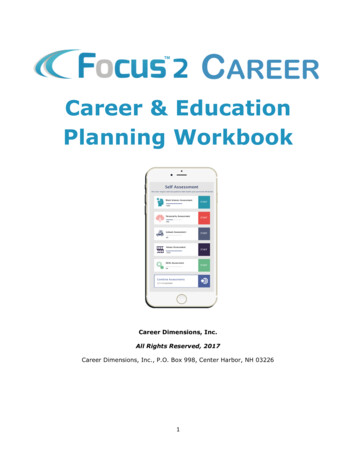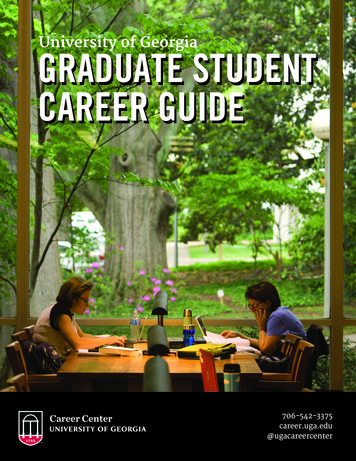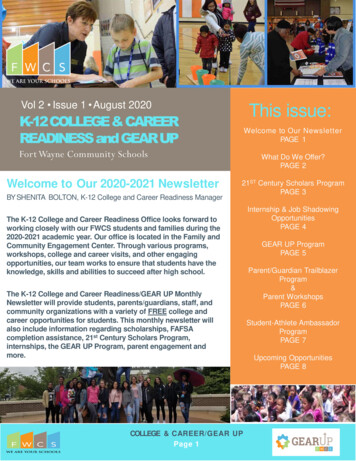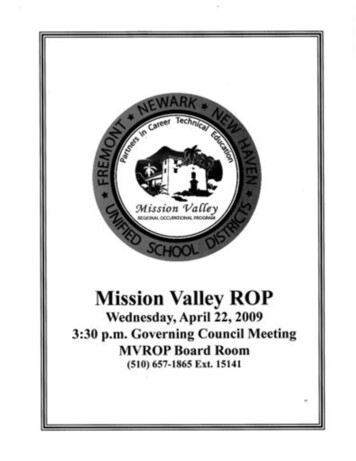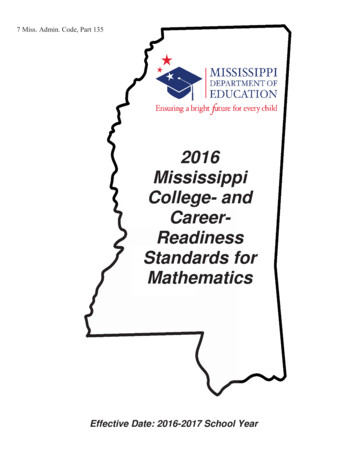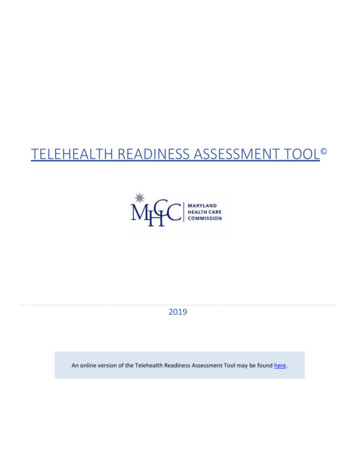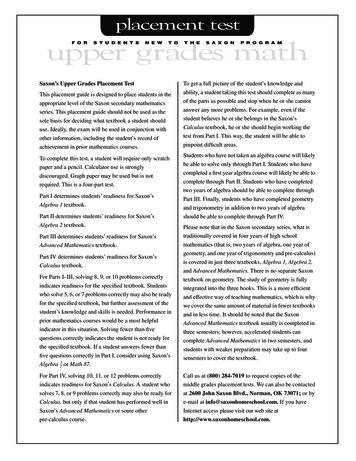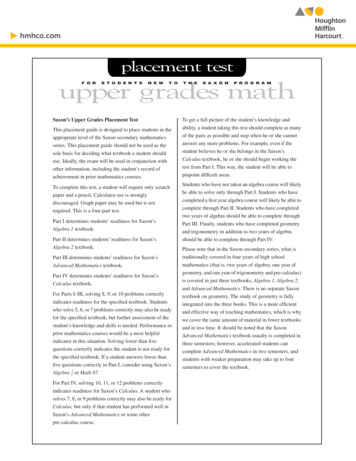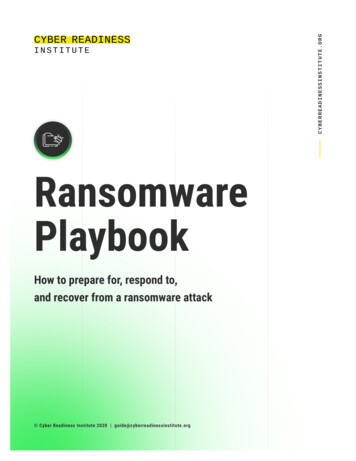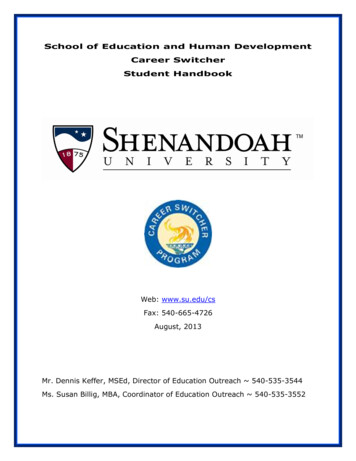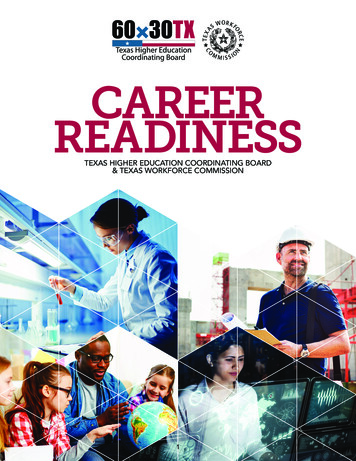
Transcription
CAREERREADINESSTEXAS HIGHER EDUCATION COORDINATING BOARD& TEXAS WORKFORCE COMMISSION1
This page has been left blank intentionally.
AGENCY MISSIONTexas HigherEducationCoordinating BoardStuart W. StedmanCHAIRFred Farias III, ODVICE CHAIRJohn T. Steen Jr.SECRETARY TO THE BOARDArcilia C. AcostaHOUSTONMCALLENSAN ANTONIODALLASS. Javaid AnwarMIDLANDMichael J. PlankHOUSTONRicky A. RavenSUGARLANDDonna N. WilliamsARLINGTONWelcome Wilson Jr.Michelle Q. TranSTUDENT REPRESENTATIVEThe mission of the Texas Higher Education CoordinatingBoard (THECB) is to provide leadership and coordination forTexas higher education and to promote access, affordability,quality, success, and cost efficiency through 60x30TX,resulting in a globally competitive workforce that positionsTexas as an international leader.AGENCY VISIONThe THECB will be recognized as an international leader indeveloping and implementing innovative higher educationpolicy to accomplish our mission.AGENCY PHILOSOPHYThe THECB will promote access to and success in qualityhigher education across the state with the conviction thataccess and success without quality is mediocrity and thatquality without access and success is unacceptable.THE THECB’S CORE VALUES ARE:HOUSTONAccountability: We hold ourselves responsible for ouractions and welcome every opportunity to educatestakeholders about our policies, decisions, and aspirations.HOUSTONEfficiency: We accomplish our work using resources in themost effective manner.Raymund A. ParedesCOMMISSIONER OF HIGHER EDUCATIONCollaboration: We develop partnerships that result instudent success and a highly qualified, globally competentworkforce.Excellence: We strive for excellence in all our endeavors.Acknowledgments: This handbook wouldnot have been possible without the supportand expertise of various contributors. TheTexas Higher Education Coordinating Boardand the Texas Higher Education Foundationwould like to thank all those who dedicatedtheir time, effort, and resources. In particular,THECB and THEF would like to thank theTexas Workforce Commission for ongoingcollaboration and financial support.The Texas Higher Education Coordinating Board does not discriminate onthe basis of race, color, national origin, gender, religion, age or disability inemployment or the provision of services.Please cite this handbook as follows: Texas Higher Education CoordinatingBoard. (2018). Career Readiness. Austin, TX.
This page has been left blank intentionally.
TABLE OF CONTENTSWelcome to Career Readiness.Why Did You Decide to Go to College?.What Does It Mean to Be Career Ready?.What Soft and Hard Skills Do You Need for Your Future Career?.What about Your Future Career?.Curricular Activities.Co-curricular Activities.Internships .Apprenticeships – Earn as You Learn .Extracurricular Activities.Activity: Identify Soft/Transferable Skills.Why Should You Be Concerned with Career Readiness Now?.Future Considerations .What If You Want to Go to Graduate School?.What Are the Steps You Should Take to Find a Career?.Here Are Some Questions You Might Want to Ask Your Advisor/Professors.What Is a Mentor?.What about Working While You Are in School?.Where to Look for Jobs.What You’ll Need to Have a Chance.How to Market Yourself.60x30TX: Texas Has Goals for Your Education.Resources.References.Appendix A: What Types of Careers Are There?.Appendix B: List of Websites 0212223242632
WELCOME TOCAREERREADINESSInside this booklet youwill find information abouthow to prepare for a careerwhile you are in college.Use this booklet as areference as you completeyour studies and movealong your career path.INCLUDED IS INFORMATION ON: Different skills you will need for your career (p. 4) How you can develop those skills while you are in collegeby taking classes and participating in activities (pp. 4-10),such as: Curricular activities (p. 5) Co-curricular activities, e.g. internships (p. 5)and apprenticeships (p. 6) Extracurricular activities (p. 7) The types of careers that exist and the skills neededfor them (p. 26) The steps you should take to find a satisfyingcareer (p. 14) How to find a job now if you want one (p. 19) How to market yourself to get a great job (p. 21)There are also many references and resources you canuse in your search for your ideal career.You can start using this booklet now! No need to wait.The information here will guide you as you chooseclasses, activities, and employment during the timeyou are in college. Good luck!01
In today’s world [colleges and universities] have to dotwo things simultaneously . . . one is to give [students]the knowledge that they need to be a learned citizenWHYDID YOU DECIDEof this state and this nation but simultaneously togive them the talents and the skills that will makethem a valued member of the workforce.TO GO TOCOLLEGE?UCLA recently asked incomingstudents that question and84.8 percent of them said theywanted “to be able to get abetter job” after graduation.Is that why you are in school?– VISTASP KABHARI, PRESIDENTThe University of Texas at ArlingtonToday more jobs require postsecondary education (degreesand certificates) than ever before. The United States mustproduce more workers with associate degrees, bachelor’sdegrees, and certificates to keep pace with mounting demandand to remain globally competitive.Earning a degree or certificate boosts your income potential(that means more money!) and gives you the skills you needto succeed in the workforce. Employees with postsecondaryeducation earn 74 percent more than those who have a highschool diploma or less, and completing your certificate ordegree is the key to earning power and being career ready!* Last year for which data is available02
WHAT DOESIT MEAN TO BECAREERREADY?Being career ready meanshaving skills that broadlyprepare you to transition fromBeing career ready means having skills that broadly prepareyou to transition from being a college student to being anemployee, manager, or entrepreneur. You will learn these skillsduring your time in school. Being career ready also means youcan demonstrate these skills when you start a job. Your collegewill let you know about the marketable skills you are acquiringin your program. For more information about that requirement,check out 60x30TX and see page 21.60x30TX defines marketable skills as “skills valued by employersthat can be applied in a variety of work settings . . . These skillscan be either primary or complementary to a major and areacquired by students through education, including curricular,co-curricular, and extracurricular activities.”In and outside of class, you will be learning the skills you needin the workforce. Learning marketable skills will help you findand keep a job and build a career once you graduate!being a college studentto being an employee,manager, or entrepreneur.Two Types of Marketable Skills Are Necessary in the Workplace:HARD SKILLS AND SOFT SKILLSHard SkillsThese skills are specific and usually measurable skills thatare needed to do a job. You will learn these skills for yourfuture career as you take courses. Hard skills, for example,might include building websites, cooking for fine diningrestaurants, performing statistical analysis, learning graphicdesign, mastering math, or understanding art restoration.These are also called technical or applied skills.Soft SkillsThese skills are also known as transferable skills becauseyou can transfer them to any job you have over the courseof your career. You will learn these skills as you interactwith teachers, course materials, and other studentsduring your courses or through extracurricular activities.Soft skills, for example, might include listening, reasoning,professionalism, courtesy, punctuality, or public speaking.You will learn hard skills in your courses, but you can alsouse sites like Khan Academy and Codecademy to teachyourself certain skills.03
WHAT SOFT AND HARD SKILLSDO YOU NEED FOR YOUR FUTURE CAREER?DID YOU KNOW THAT ALL JOBS REQUIRE HARD SKILLS AND SOFT SKILLS?Check out the example jobs below, and then think about what hard and soft skills you will need for yourfuture career.You will find a few necessary skills listed for each example career below. Can you think of more skills thatmight be needed for these careers?CHEFHard SkillsSoft SkillsUse different types of knives correctlyCommunicate with other people in the kitchenUnderstand chemical reactions among ingredientsManage time (in order not to burn anything)TEACHERHard SkillsSoft SkillsPlan lessons (requires knowledge of a content area)Be creative in developing activities to engage studentsKnow how to create tests and quizzesWork with other teachers as a teamPIPEFITTERHard SkillsSoft SkillsUnderstand the mechanics of piping systemsBe detail-oriented and preciseProvide maintenanceAbility to problem-solveNOW IT IS YOUR TURN! WHAT ARE SOME HARD AND SOFT SKILLSTHAT ARE NEEDED IN THESE PROFESSIONS?*FINANCIAL ADVISORHard SkillsSoft SkillsFILM EDITORHard SkillsSoft Skills* See end of this section for examples04
WHAT ABOUT YOUR FUTURE CAREER?WHAT ARE SOME HARD AND SOFT SKILLS YOU MIGHT NEED?YOUR FUTURE CAREERHard SkillsSoft Skills* Financial Advisor: hard skills – e.g., knowledge of mathematics, understanding the stock market; soft skills –e.g., be detail-oriented, know how to gather information. Film Editor: hard skills – e.g., use editing software,know how to transition between scenes; soft skills – e.g., think critically, be able to follow directions.CURRICULAR ACTIVITIESEmployers say that soft skillsare just as important,or even more importantthan hard skills for gettingand keeping a job.But how do you learnsoft skills while in school?The answer is throughcurricular, co-curricular andextracurricular activities!Your classes will teach you to write, discuss, debate, research,problem-solve, manage time, and work hard. If you are in atechnical major like engineering, you will be required to takea humanities or behavioral/social science class or two. Thoseclasses will help you learn those soft skills.Make sure you ask your professors and academic advisorswhat marketable skills you will be learning in your program!CO-CURRICULAR ACTIVITIESTake advantage of internships, study abroad opportunities,apprenticeships, service learning, student leadershipprograms, and other ways to gain hands-on experience whileearning credit toward your degree. These are experientiallearning opportunities that contribute to gaining skills andabilities that are part of the core competencies (such as theTexas Core Curriculum) and/or outcomes established by yourcollege or university.CO-CURRICULAR ACTIVITIES MAY INCLUDE INTERNSHIPS AND APPRENTICESHIPS.InternshipsInternships are short-term periods of work experience. They may be paid or unpaid, but in either caseyou would be learning about how a particular industry works. You may be asking if you really want to workin a certain field. If you don’t know, an internship is a good way to find out, and you may be able to earncollege credit while working an internship.Internships are not just good ways to learn soft skills. Internships often lead to jobs! Before you take aninternship, though, ask the following questions:05
Will I be paid? Some internships offer a paycheck, and some are on avolunteer basis and unpaid.Will I earn credit? You will need to check with your school, andremember that if you are earning credit, you may have to pay for thesemester credit hours through your school.What kind of work will I be doing? Make sure you are learning aboutthe industry you will be working in.Does the company ever hire interns for full-time positions? Good news!Many interns are later hired full-time in a variety of industries.Internships are the test driveemployers need before they seal thedeal—so interns, this is your shot toshow you’re a worthy hire. Do it welland you could be part of the nearly52 percent of interns offered full-timejobs, according to research by theNational Association of Colleges andEmployers (NACE). (Thottam, 2018)Know your rights! Beforeyou take an internship,check with your CareerServices office to learnabout what employers canand cannot ask of you. Youcan use these questionsfrom the U.S. Departmentof Labor to guide you.People who take internships do not just get jobs, accordingto a Gallup poll, they are often happier at their jobs later on.Here’s some advice: Start early! You can begin looking for internships rightaway and you can have more than one while you are inschool. No need to wait until you are about to graduate.And start early in the school year; do not wait for thespring to try to find an internship for the summer. Make sure you do your research! You want to chooseinternships that are right for your career goals.Apprenticeships – Earn as You LearnThe Registered Apprenticeship Program is a jobtraining system for multiple occupations. Apprenticeshipcareers include advanced manufacturing, construction,energy, finance and business, healthcare, hospitality,information technology, telecommunications,and transportation.If you choose to pursue an apprenticeship, you will want tomake sure that it is registered, meaning that the program’sstandards (curriculum, wage increments, and competencylevels) have been approved by the U.S. Department of Labor’sOffice of Apprenticeship. When you complete the program,you will be awarded a nationally recognized certificate. Thatrecognition will signal career readiness to your future employers.Registered Apprenticeships combine related classroominstruction with structured on-the-job learning supervised byexperienced journey workers. Registered Apprentices whosuccessfully complete the prescribed training hours in aRegistered Apprenticeship Program become certified,highly skilled workers.06
Registered Apprentices are full-time, paid employees who work a regular 40-hour week and attendrelated classroom training a few hours each week, which is the “earn-while-you-learn” model ofRegistered Apprenticeship. Most training programs last three to five years. As you complete each year ofthe Registered Apprenticeship Program, you will usually experience an increase in classification, as well asa wage increase for each year, not just when you finish.The experiences you gain as a Registered Apprentice can help make you a more informed, productive,and motivated employee. Statistics show that Registered Apprenticeship graduates earn more, havemore stable work records, and are promoted sooner and more often than workers who have not beentrained through apprenticeship programs.For more information on how you can get paid to learn, ask your Career Services office about RegisteredApprenticeship Programs, or go to the Apprenticeship Training page at Texas Workforce Commission.We love students whoare doing things outsideof their degree program.It can be intramural sports,president of the French club,or a semester abroad.Just showing us thatthey are well-rounded.– CARLENA “CJ” HARRIS, MANAGERTalent Acquisition and OrganizationalDevelopment, Luminex CorporationEXTRACURRICULAR ACTIVITIESThese are experiences that provide the opportunity to engagewith students and faculty and/or to connect to others withinthe community in meaningful ways.Volunteer in your community, join a student organization,or play sports. All these activities will teach you valuable skillsyou can transfer to the workforce. Plus, your employer willbe impressed!Being well-rounded is only the beginning. You are learningthose important soft skills when you participate in extracurricularactivities. You also are meeting people who may be able togive you career information or a reference later on.07
ACTIVITY:IDENTIFY SOFT/TRANSFERABLE SKILLSNext to each skill listed below, write a brief example of an instance in your life or in a class in schoolwhen you used that skill. Include the year you used it. This information may prove useful for buildingyour résumé.You can also try this skill identification tool:Access the Match your Skills to Career tool. If you can’t remember using these skills, that’s usefulinformation. Now you know where you can grow your skill set! Those are not all of the soft skills thatexist, but the activity will give you an idea of your strengths and where you can learn more skills.CRITICAL THINKING/PROBLEM-SOLVINGThe ability to conceptualize future needs and solutions for meeting those needsTransferable SkillInstance in your life or in a class in school when you used that skillForecasting, predictingCreating ideasIdentifying problemsImagining alternativesIdentifying resourcesGathering informationSolving problemsSetting goalsDefining needsAnalyzingDeveloping evaluation strategiesORAL/WRITTEN COMMUNICATIONThe skillful expression, transmission, and interpretation of knowledge and ideasTransferable SkillInstance in your life or in a class in school when you used that skillSpeaking effectivelyWriting conciselyListening attentivelyExpressing ideasFacilitating discussionsProviding feedbackNegotiatingPersuadingReporting informationDescribing feelingsInterviewingEditingCommunicating professionallythrough writing08
TEAMWORK/COLLABORATIONThe use of interpersonal skills for resolving conflict, relating to and helping peopleTransferable SkillInstance in your life or in a class in school when you used that skillDeveloping rapportBeing sensitiveListeningConveying feelingsProviding supportMotivatingSharing creditCounselingCooperatingDelegating respectfullyRepresenting othersPerceiving feelingsAssertingDIGITAL TECHNOLOGYThe willingness and ability to learn new technologiesTransferable SkillInstance in your life or in a class in school when you used that skillTypingUsing presentation softwareCreating spreadsheetsUsing databasesUsing the InternetUsing emailUsing social mediaKnowing what technology is bestfor the jobLearning new technologyGLOBAL/INTERCULTURAL FLUENCYLearning from and valuing diversityTransferable SkillInstance in your life or in a class in school when you used that skillBeing curious about other peopleSeeing multiple points of viewUnderstanding culturaldifferencesIncluding othersUsing language sensitive topeople’s differences09
LEADERSHIPSkills used in supervising, directing, and guiding individuals and groups in the completion of tasksand fulfillment of goalsTransferable SkillInstance in your life or in a class in school when you used that skillInitiating new ideasHandling detailsCoordinating tasksManaging groupsDelegating responsibilityTeachingCoachingCounselingPromoting changeSelling ideas or productsMaking decisionsManaging conflictPROFESSIONALISM/WORK ETHICThe day-to-day skills that help promote effective production and work satisfactionTransferable SkillInstance in your life or in a class in school when you used that skillImplementing decisionsCooperatingEnforcing policiesBeing punctualManaging timeAttending to detailMeeting goalsEnlisting helpAccepting responsibilitySetting/meeting deadlinesOrganizingMaking decisionsCAREER MANAGEMENTThe ability to voice your skills, strengths, and knowledgeTransferable SkillInstance in your life or in a class in school when you used that skillAdvocating for yourselfPursuing opportunitiesAsking for what you wantTelling others what you do wellCheck out your Career Services office for more information about opportunities to learn marketable skills.Career Services offers lots of resources, and there are knowledgeable staff who can help you build your résuméand search for a job. Students who use Career Services feel more confident as they enter the job market.10
WHYSHOULD YOU BECONCERNED WITHCAREERREADINESSNOW?Some employers say that college students are graduatingwithout the skills they need to perform well on the job.Graduates do not agree. As a student and aspiring graduate,you need to tell employers that you have learned the skillsthey need in the workforce. Students who can effectivelymarket their skills to potential employers can secureemployment that pays competitively in their field.It is never too early to think about what career you want.You do not need to have all the answers now. Rememberthat some skills you will be learning (like communication skills)are transferable to many professions.Your résumé is only part of the story. You will need to be able to talk about youraccomplishments and describe the skills you have learned. Ask a professor, friend,family member, or Career Services counselor to help you with a mock interview!11
FUTURE CONSIDERATIONSYou will want to choose a satisfying career that will pay a salary that matches your lifestyle expectationsand has good job opportunities. For example, working at a retail clothing store may be fun, but you’llhave a harder time paying all the bills. At the same time, you will also need to consider carefully collegecertifications and majors, e.g., archeology is a very cool field, but recent data shows only 10 job openingsfor archaeologists in Texas per year for the next few years. You may also want to think about how muchyour degree will cost relative to the average salaries in your industry. This is especially important if youtake out loans to complete your degree because you will have to pay them back.Advances in technology and new business practices also may affect certain careers. Some jobs thatrequired unskilled labor or repetitive tasks can now be done anywhere in the world or completed byrobotic machinery – many manufacturing jobs, for example. The manufacturing industry still has manyhigh-paying job opportunities, but it needs workers skilled in robotics, computer-controlled machining,and those who can maintain and repair complex manufacturing machinery. These jobs require a moreadvanced set of skills than previous positions in manufacturing.You Have Many Career Options, But You MightWant to Consider Two Conditions to Improve YourChances of Getting and Keeping a Job. First, consider looking for a career that requires a veryhigh level of skill or creativity, such as writing, designing,product development, market strategy, or financialplanning. Employers are always looking for creativeworkers who can use their talents and technology tosolve business problems and create opportunities. Second, you might consider learning a skilledtrade, such as carpentry, nursing, or auto repair.For these careers, you must be physically presentto provide service, and your required skills will bein high demand.Combining proximity with creativity in a career gives youadded security.Consider that some jobs that will exist in the future have noteven been dreamed up yet! You might change the type ofwork you do over the course of your career. We all must belifelong learners to stay competitive in the job market.12
WHAT IFYOU WANT TOGO TOGRADUATESCHOOL?That’s great! You will also need to prove to graduate schoolsthat you have learned prerequisite skills in your program.The marketable skills that you learn now will help you as youapply to graduate programs.Check with the graduate school program you want to attendto see exactly what they require for your application. Mostschools require some or all of the following:1234Exams. Usually schools will require that you take anentrance exam to prove that you have mastered theskills you will need to be successful in a graduateprogram. The type of exam you take will depend onwhat kind of graduate school you want to attend.The GRE is a common requirement for many types ofgraduate programs, but law schools usually requirethe LSAT, medical schools the MCAT, and businessschools the GMAT. Some schools also require asubject-specific GRE. Do your research to know whattype of exam(s) you should take for your applications.Personal statement. Many schools will require thatyou write a personal essay as part of your application.Make sure that you write your personal statementaccording to the guidelines that the school gives you,including topic and length. Tailor your essay to theprogram you are applying to. This will require that youknow something about the research that professorsare doing at that school. Lastly, focus on your personalexperience. Write about why you want to attendthat particular program and why the school you areapplying to is your top choice.Letters of recommendation. You will need lettersfrom professors (and sometimes employers) whoknow your experience and capabilities and believethat graduate school is the right choice for you. Getto know your professors. Attend office hours and askquestions. Talk to them about your career goals andget their advice. If professors know you well, it will beeasier for them to write stellar recommendations.Transcripts. Your transcript is a document that detailsall of your college classes and includes your gradesand Grade Point Average (GPA). Check your collegewebsite to find out how you can request that yourtranscript be sent to graduate schools. If your institutionoffers a co-curricular transcript that describes yourleadership roles and other activities, you can sendthat too.13
INQUIRE Schedule an appointment with Career Services your firstsemester. There you can use a career inventory tool to helpyou discover how you can find a job that aligns with yourpersonality, interests, and life goals. Determine your interests and strengths. There are lotsof tools available to help you do this. Career Services canhelp, but you can also use websites like RoadTripNationto give you an idea of what other people with yourinterests have done for work. Also, check out TexasGenuineto explore your interests, TexasCareerCheck to investigatedifferent types of jobs, and LaunchMyCareerTX to discoverwhat skills you will need. Explore those interests by taking classes and participatingin co-curricular and extracurricular activities. Ask your academic advisor what classes you should taketo gain the marketable skills to succeed in the careeryou want. Start a record of activities you participate in, classes youtake, and what skills you learned. This will help you withyour résumé, which you should start now. Make sure youkeep it up to date. Ask your family and friends about their jobs. Do you thinkyou would like to work where they work? Great, but do notlimit yourself. There are lots of careers out there that mightfit your interests and goals. Go to the alumni office at your school and ask aboutalumni who are working in the field you are interested in. Think about where you would like to work. A bigcompany? A small business? For yourself? Each hasbenefits and limitations. Do some research and thinkabout what type of employment is right for you. Go to faculty office hours and ask them about thecareers you are interested in and the skills you arelearning (and hopefully find references!). Students whobuild relationships with professors tend to be moreconfident about their job prospects.WHAT ARETHE STEPSYOU SHOULD TAKETO FIND ACAREER?Inquire . . .Research . . .Act . . .14
HERE ARE SOME QUESTIONS YOU MIGHT WANTTO ASK YOUR ADVISOR/PROFESSORS: Where can I get assistance with choosing my major? Where can I find out about different types of jobs? Who can make sure that I’m taking the courses I need? What classes do you suggest I take to help me in my career? Where can I find Career Services? What do people in my program usually do for work after they graduate? What skills will I learn in this program that will help me get a job later? Will what I want to do require further education? What other activities do you suggest I participate in to help me in my career? How do I get involved in extracurricular activities? Who can help me with study skills, time management, and goal setting? Who can assist me with my writing skills? How do I find jobs related to my degree? When should I consider looking for an int
Hard Skills Soft Skills. Understand chemical reactions among ingredients Manage time (in order not to burn anything) Use different types of knives correctly Communicate with other people in the kitchen. TEACHER. Hard Skills Soft Skills. Plan lessons (requires knowledge of a content area
